Could compaction-busting crops become a reality?
 © Dr Pete Berry
© Dr Pete Berry Soil compaction is a major challenge for many arable farmers, exacerbated by the intensification of operations and trafficking of large machinery – not to mention recent waterlogging leaving soils vulnerable to damage.
Compaction reduces root growth, soil porosity and increases bulk density, limiting the availability of essential water and nutrients and subsequently restricts crop yield.
So, could breeding for compaction-busting plants become a reality?
A spring wheat field trial in Nottinghamshire run by a team from the University of Nottingham, Lancaster University, Rothamsted Research and independent crop consultant Adas is investigating exactly this.
See also: Tips on tackling five weed issues in no-till systems
The role of ethylene
Instinctively, root growth in compacted soils was thought to be limited by the ability of roots to penetrate dense soil layers, but research from the University of Nottingham reveals the important role of one particular plant hormone in suppressing growth.
“Plant roots sense soil compaction via diffusion of the plant hormone ethylene, rather than simply being suppressed by mechanical factors,” explains Prof Sacha Mooney, chair of soil physics at the University of Nottingham, presenting research at the Rootstock conference in Exeter, Devon.
Using ethylene to ‘sense’ soil changes
Ethylene is a gas produced by root tissues, and its ability to diffuse away from the roots is influenced by the structure of the surrounding soil.
Compacted soils have smaller pore volumes which restricts the diffusion of ethylene between roots, causing the hormone to accumulate in root tissues, which restricts growth.
“In well-structured soils which are loose and porous, ethylene diffuses from roots into the pore spaces so plants do not pick up this signal and continue to grow as usual,” explains senior research fellow Dr Bipin Pandey from the University of Nottingham.
“In compacted soils, due to the decreased volume of air-filled pores, ethylene builds up in high concentrations. The root senses that ethylene is high and it’s growth is stunted,” Bipin continues.
Ethylene potentially acts as an early warning signal for roots to avoid compacted soils. If so, could this provide a pathway for breeders to select crops resilient to soil compaction in the future?
Nottinghamshire field trial
The field-scale trial in Nottinghamshire is testing the compaction resistance and root sensitivity to ethylene of eight spring wheat varieties on the UK recommended list, under a range of cultivation treatments.
‘We believe crop yields are frequently limited by soil compaction so if we can find varieties that are less sensitive to strong soil then this would be a great benefit for farmers,” says Dr Pete Berry, crop physiologist at Adas.
“By testing our ethylene mechanism under field conditions, we can assess whether less ethylene sensitive lines are more resilient to compaction stress,” explains Prof Malcolm Bennett, chair of plant sciences at University of Nottingham.
“Earlier results obtained by the team revealed ethylene sensitive root growth is a good predictor for sensitivity to soil compaction stress,” continues Malcom.
The key gene(s) that control the ethylene compaction response are being identified.
Once confirmed, this data will be sent to UK plant breeders via the Biotechnology and Biological Sciences Research Council (BBSRC) ‘Breeders Tool-kit’ scheme – part of the Developing Sustainable Wheat programme.
“We will be in a good position to start using gene-editing to re-engineer crops such as wheat and make them more resilient to soil stresses like compaction,” says Malcom.
The spring wheat trial is a fully-replicated field trial, running over two years from 2023 and 2024 across a o.5ha area.
A range of different tillage and compaction treatments including ploughing, minimum tillage and direct drilling are being investigated, supported by the BBSRC as part of our BreakTHRU research project.
“We are confident that our results can be extrapolated to winter wheat as we have also conducted studies on wheat landrace collections that include both winter and spring wheat lines,” says Malcom.
The team have already observed that the ethylene mechanism also works in other cereals such as rice, maize, tomatoes and the close relative of oilseed rape, Arabidopsis.
Other crops such as legumes are being tested. However, these further experiments are being carried out under lab conditions due to limited funding for field trials, which are very labour intensive.

